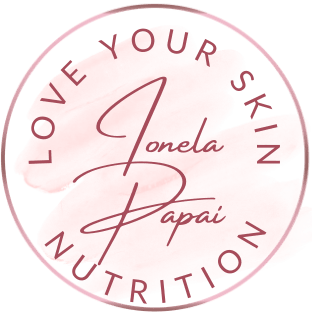In an age where everything seems to be about looking good, not feeling confident about the skin you’re in (on every level) can have a really negative impact on how you experience your life. It IS possible to have an enormous impact on the way your skin looks and feels by making some changes to the way you eat – and I don’t mean overly restricting the foods you love or going on a juice cleanse.
A word of truth… There is no miracle potion you can buy to put on your skin that can achieve what a good diet can. I wish I could tell you otherwise. Of course, there are products that can shift the dead skin cells, which lets the world see your beauty. But if your body isn’t happy, your skin will be sending messages to the world that
that’s the case.
Whether it’s hormonal acne (time-of-the-month spots or that hideous peri-menopause thought-I-was-past-all-of-that acne) or inflamed skin, like eczema or psoriasis, I want you to know that the answer lies in the supermarket and health food store rather than the pharmacy or beauty department.
I’d like to highlight some of the common causes of conditions I see in clinic and some typical solutions. Nothing beats a personalised consultation to get the results you are looking for – especially if you’ve been struggling for a while. If you know you need a real breakthrough in this area, we should definitely talk. I warmly invite you to get in touch – email, message on social media, visit the website… Whatever works for you.Acne ~ Acne is a very common problem you tend to think of as only affecting children going through puberty. For many people, the condition does resolve itself by the time they get to their 20s, while for others, it simply doesn’t. And many women are alarmed by a return of hormonal acne in their 40s.
The main symptoms of acne are greasy skin and spots that might range from whiteheads to painful red papules and pustules filled with puss.
There are four main causes: increased turnover of skin cells, excess sebum production (one big trigger is hormone imbalance), bacteria or an inflammatory response. Dietary approaches are varied, because it very much depends on your personal triggers.
Though protocols vary, they might include looking at how well your body detoxifies toxins and hormones, rebalancing hormones, digestive health, avoiding grains and/or dairy, and addressing any nutrient deficiencies.
Rosacea ~ This is a condition that appears as red patches on the nose, cheeks, chin or forehead. It looks a bit like acne and can be very painful. The condition can come and go in the early stages, but if not dealt with, it can result in more permanent and visible blood vessel damage (think bulbous noses).
No one really understands what causes it, although there are links to increased blood flow to the skin (you’re more likely to have rosacea if you’re fair-skinned and blush easily), more inflammatory proteins in the skin, and high levels of free radicals among others.
Common nutritional approaches might include tackling those things that make you flush more.
This could be reducing environmental triggers, identifying food intolerances or other trigger foods (foods high in histamine can be a problem), balancing hormones and lifestyle strategies to manage stress.
Psoriasis ~ People with psoriasis have skin cells that turn over much quicker than those of regular folk.
This leads to an accumulation of skin cells on the surface of the skin; a psoriatic plaque that appears as raised patches covered with silvery scales. It can look quite angry and red due to an increase in blood vessels needed to support the rise in the number and production of cells.
Scientists used to think psoriasis was simply a skin condition, but now we know that its roots lie in the immune system. It’s an autoimmune condition and is often seen alongside digestive problems thanks to links with increased intestinal permeability (aka ‘leaky gut’).
Autoimmune conditions can be quite complex to unravel, but you may get some relief by going gluten-free and avoiding vegetables from the nightshade family, like potatoes, tomatoes, aubergines, peppers, and chillies and eating plenty of anti-inflammatory omega-3 foods like oily fish, flax and chia seeds.
Eczema ~ Healthy skin is moisturised by fats and oils and plumped up with adequate water levels. In eczema sufferers, the skin fails to produce the necessary amounts of fats and oils, and it is less able to retain water. As a result, the body’s protective layer isn’t as good as it could be.
You might notice itchy patches on the hands, elbows, and in the “bending” areas of the body, such as the inside of the elbows and back of the knees or the neck. But eczema can appear anywhere, including the armpits, chest and eyelids.
Eczema is often a sign of a ‘leaky gut’, a condition where undigested foods and bacteria end up passing through the gut lining into the bloodstream. These toxic substances result in inflammation. One way to deal with this is to remove triggers that make inflammation worse – such as gluten, sugar and dairy – from your diet.

